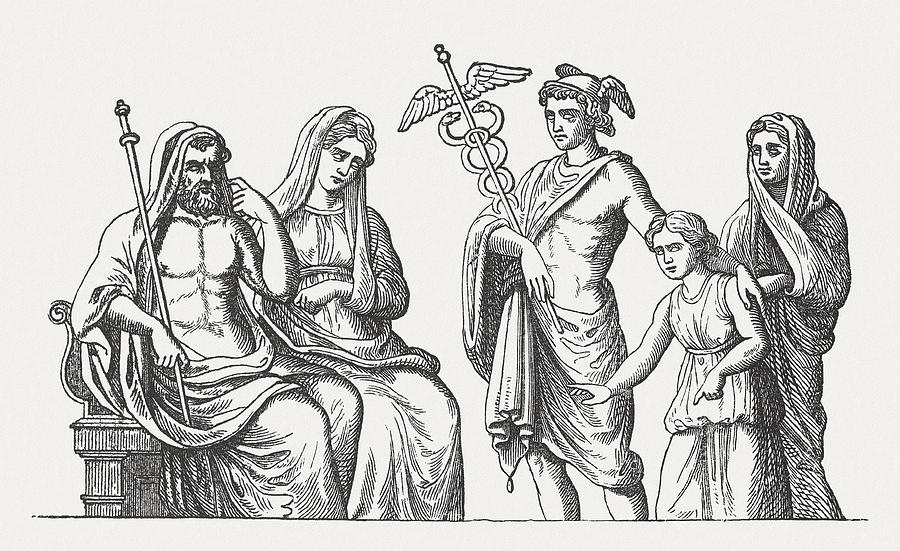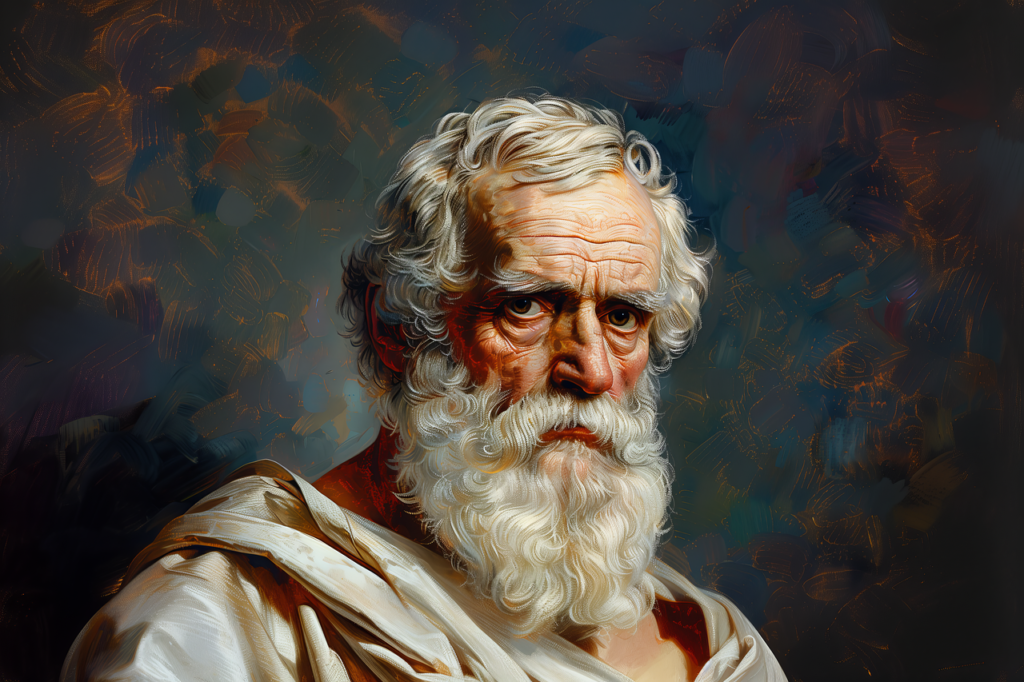
Fascinating Facts About Hades: Greek God of the Underworld
Facts About Hades
This article will uncover numerous facts about Hades that provide a deeper understanding of his place within ancient Greek religion and how he compares to the other Greek gods.
Hades, the Greek god of the underworld, holds a pivotal role in Greek mythology. As the ruler of the dead, his influence extends far beyond the shadows.
Interestingly, his name invokes images of darkness and fear, but there is more to Hades than meets the eye. In Greek mythology, he is both feared and respected, often misunderstood by modern readers.
Although Hades wasn’t one of the gods who resided on Mount Olympus, his importance among the Olympian gods cannot be denied.
Together with his brothers Zeus and Poseidon, Hades ruled different realms of the cosmos. This article will explore Hades’ domain, his role in the myth of Persephone, and the impact he has had on modern perceptions of death and the afterlife.
You will learn key facts about Hades that are crucial for understanding his character and legacy.
The Role of Hades in Greek Mythology
Hades, often referred to as the king of the underworld, was born to the Titans Cronus and Rhea. His siblings include Zeus, Poseidon, and other notable Greek gods.
After the divine war known as the Titanomachy, Hades, along with his brothers, divided the world into three parts: the sky, the sea, and the underworld.
While Zeus became the king of the gods, Hades was given control over the underworld, a place where dead people reside.
Ruler of the Underworld
As the ruler of the underworld, Hades governed a complex and often feared realm. In ancient Greek culture, the underworld was not merely a place of punishment. But also a final destination for all souls.
The underworld included several regions, such as the Elysian Fields, where heroic and virtuous souls were sent, and the Asphodel Fields, where the ordinary dead would go.
There was also the place of punishment, known as Tartarus, where wicked souls were tormented for eternity.
Although Hades was associated with death, he was not considered the god of death; that title belonged to Thanatos.
Hades’ responsibility was more about maintaining order in the afterlife and ensuring that the dead remained in his domain.
Facts About Hades

The Myth of Persephone
One of the most well-known facts about Hades involves the abduction of Persephone, daughter of Zeus, the chief god, and daughter of Demeter, the goddess of agriculture.
According to the myth, Hades fell in love with Persephone and took her to the underworld to become his wife.
This event led to a great famine. Because Demeter, distraught over the loss of her daughter, refused to allow crops to grow.
Eventually, a compromise was reached where Persephone would spend one-third of the year with Hades in the underworld and the remaining time with her mother in the world of the living.
This myth symbolically explains the cycle of the seasons. With Persephone’s descent representing winter and her return to earth signifying spring.
Wealth and Power of Hades
Often misunderstood as an evil god, Hades was more complex than simply being the lord of the underworld.
His domain extended to the wealth of the earth, including precious metals like gold and silver.
In fact, one of his lesser-known titles was the god of wealth, as the riches beneath the earth, such as minerals and treasures, were under his control.
The Realm of Hades: A Place Beyond the Living
The underworld, often referred to as the realm of Hades, is a central feature in many Greek myths.
It was considered an extensive and complex domain. With rivers, regions, and creatures that guided or guarded the souls of the dead.
One of the most famous rivers, the River Styx, was the boundary between the world of the living and the world of the dead.
Souls would cross this river on their journey to the underworld, often with the help of Charon, the ferryman.
Interestingly, those who could not pay for the crossing were said to wander the shores of the Styx for eternity, an important belief that underscored the funeral rites practiced in ancient Greece.
The Creatures of the Underworld

Among the notable inhabitants of Hades’ domain was the three-headed dog, Cerberus, who guarded the gates of the underworld, ensuring that no soul could escape.
Cerberus played a significant role in ensuring that the dead remained in their proper place. A critical aspect of maintaining order in the underworld.
However, this mythical beast wasn’t just feared by mortals; even some gods and heroes, such as Heracles and Orpheus, had to face Cerberus in their legendary quests.
Additionally, within the house of Hades, spirits known as shades roamed freely, living their shadowy existence.
These souls would either find peace in the Elysian Fields or face eternal punishment in Tartarus, depending on their deeds in life.
Hades and His Symbolism in Ancient Greece
Contrary to popular belief, Hades was not considered the cruel or villainous god that modern interpretations often portray.
In ancient Greek religion, Hades was respected as a necessary part of life, symbolizing both death and the wealth of the earth.
Precious metals, such as gold, were seen as part of Hades’ domain because they originated from beneath the ground, reinforcing his title as the god of wealth.
Moreover, Hades was regarded as a good husband to his wife Persephone, despite the initial circumstances of their union.
Many myths describe their relationship as one of balance. With Hades treating Persephone with honor and respect in his dark realm.
This idea contrasts with modern depictions that often label Hades as an evil god, focusing instead on his role in maintaining cosmic order.
Facts About Hades
The Importance of Hades in Greek and Roman Mythology
In both Greek mythology and Roman mythology, Hades holds a crucial place. While his Roman name is Pluto, his role remained largely the same across both cultures.
He governed over the afterlife and was responsible for the souls of the dead.
However, in Roman beliefs, Pluto’s association with wealth and the riches of the earth was more pronounced. Reflecting the Roman emphasis on material abundance.
Hades’ Interaction with Other Gods

In myth, Hades rarely left his domain, preferring to remain in the shadows of the underworld. Nevertheless, his relationships with other gods were significant.
As the brother of Zeus and Poseidon, he was part of a powerful triad that controlled the cosmos.
This relationship highlights an important fact about Hades: while he ruled the underworld, he still maintained a close connection to the other Olympian gods, particularly in times of great need or when balance needed to be restored between the realms of gods and mortals.
Frequently, Hades interacted with Hermes, the god who guided souls to the underworld, and with Demeter, Persephone’s mother, whose anger over her daughter’s abduction affected the cycle of nature.
These interactions show that Hades, while often isolated, played a key role in keeping the natural and divine order intact.
Facts About Hades in Modern Media
Hades has continued to fascinate audiences through the centuries. He frequently appears in modern media, from literature to film and video games.
These portrayals often depict him as a dark and brooding figure, yet the truth is more nuanced. In ancient myths, Hades is not depicted as evil, but rather as a ruler with a responsibility to the dead.
Interestingly, in many modern media representations, including popular movies and television series, his story is often intertwined with the myth of Persephone. Further deepening his association with the seasons and the natural world.
The House of Hades: A Place of Judgement and Afterlife
In ancient Greek beliefs, the House of Hades was not merely a place where souls went after death, but a realm where judgment was passed, and each soul was assigned its rightful place.
Upon arrival, the souls of the dead were judged by three figures. Minos, Rhadamanthus, and Aeacus—who determined where the soul would reside for eternity.
For those who led virtuous lives, the Elysian Fields awaited, offering eternal peace and happiness.
However, for the wicked, the depths of Tartarus served as a prison for the damned, where souls faced never-ending punishment.
Between these two extremes lay the Asphodel Fields, where ordinary souls, neither exceptionally virtuous nor wicked, spent their afterlife in quiet reflection.
This division of the afterlife highlights one of the interesting facts about Hades: his domain was not just about torment and despair, but also about fairness and balance in the treatment of the dead.
The Symbols and Sacred Plants of Hades
Several symbols are associated with Hades and his power over the underworld. Chief among them is his ebony throne, which signifies his authority over the dead.
Another important symbol is the pomegranate seed, linked to the myth of Persephone. According to this myth, Persephone was tricked into eating pomegranate seeds during her time in the underworld. Binding her to spend part of the year with Hades.
This symbol not only represents the cycle of life and death. But also reinforces the idea of Hades’ role in the natural order.
Additionally, Hades is linked to certain plants, such as the mint plant and the cypress tree, both of which were associated with death and funerals in ancient Greek culture.
The use of these plants in rituals and burials reflected the reverence the ancient Greeks had for Hades as the overseer of the dead.
The Special Powers of Hades
One often overlooked fact about Hades is the special powers he possessed. Unlike his brothers, Zeus and Poseidon, who wielded thunder and control over the seas. Hades’ powers were more subtle but no less significant.
Hades had the ability to render himself invisible with the help of a magical helmet, known as the Helm of Darkness.
This allowed him to move unseen among gods and mortals alike, an ability that played a key role in many famous myths.
Moreover, Hades had dominion over the forces of life and death. While he did not directly cause death (as that was the role of Thanatos, the god of death), he ensured that no soul could escape the underworld.
His control over the dead was absolute, making him one of the most feared gods in both Greek mythology and Roman mythology.
Hades as the God of Wealth

One lesser-known fact about Hades is his title as the god of wealth. This stems from his association with the treasures found beneath the earth, such as gold, silver, and other precious metals.
The Greeks saw these materials as gifts from Hades, hidden deep within the ground, under his control.
This connection to material wealth highlights the duality of Hades’ character—he was not only the ruler of the underworld but also a benefactor of riches from the earth.
Interestingly, this aspect of Hades’ power carried over into Roman mythology, where his Roman name Pluto is derived from the Greek word “ploutos,” meaning wealth.
Thus, while modern readers often focus on Hades’ role as the lord of the underworld, ancient cultures viewed him as a figure of abundance as well.
Hades’ Role in the Story of Orpheus
One of the most enduring Greek myths involving Hades is the story of Orpheus. In this tale, Orpheus, a talented musician, descends into the underworld to retrieve his beloved wife, Eurydice. After she dies from a snake bite.
Armed with only his lyre, Orpheus plays music so beautiful that it softens the heart of Hades and his wife Persephone, who agree to let Eurydice return to the land of the living under one condition: Orpheus must not look back at her as they ascend to the surface.
This story illustrates a more compassionate side of Hades, showing that he is capable of understanding love and sorrow.
However, when Orpheus breaks the condition and looks back, Eurydice is lost forever. Proving that even the most lenient of gods, including Hades, cannot undo the laws of the underworld once they are set in motion.
Facts About Hades: Frequently Asked Questions
Who were the parents of Hades?
Hades was the son of the Titans Cronus and Rhea, making him the brother of Zeus and Poseidon.
Was Hades an evil god?
No, Hades was not considered evil in ancient Greek religion. He was a fair ruler of the dead and held responsibility for maintaining balance in the afterlife.
What is the Roman name for Hades?
In Roman mythology, Hades is known as Pluto, associated with both the underworld and wealth.
Why is Hades associated with wealth?
Hades was called the god of wealth because of his control over the riches beneath the earth. Such as gold, silver, and other valuable resources.
What was the role of Persephone in Hades’ life?
Persephone was the wife of Hades, spending part of the year in the underworld with him and the remainder with her mother, Demeter, in the world above.
Hades in Comparison to Other Greek Gods
When considering Hades in relation to other Greek gods, his character often stands out due to his unique role.
While Zeus ruled the skies and Poseidon controlled the seas, Hades governed a realm that was often feared—the underworld.
Despite this, he did not seek power or dominion over others, unlike some of the other Olympians. Instead, Hades preferred to remain in his dark kingdom, maintaining order over the dead.
This sets him apart from gods like Ares, the god of war, or even Zeus, the king of the gods, whose ambition and interventions often led to chaos on Earth.
Moreover, while many of the Olympian gods had numerous affairs and complex relationships, Hades remained loyal to his wife Persephone, which paints a picture of him as a good husband in contrast to gods like Zeus, who frequently engaged in extramarital affairs.
This detail, though often overlooked, adds depth to Hades’ character and emphasizes his devotion.
Facts About Hades

Myths Surrounding Hades and His Legacy
One of the most intriguing aspects of Hades’ mythology is how his stories have survived the passage of time.
Myths like the abduction of Persephone and the story of Orpheus continue to captivate modern readers and audiences. Additionally, Hades plays a significant role in understanding the ancient Greek culture surrounding death and the afterlife.
His presence in the Homeric Hymn and the Orphic Hymn further solidifies his importance as one of the elder gods, whose authority and power were recognized by all.
Hades’ portrayal in modern media also continues to evolve. He appears in everything from literature and film to video games. Where he is often depicted as a brooding or misunderstood figure.
However, in these retellings, the core facts about Hades—his authority over the dead, his wealth, and his commitment to balance—remain consistent, showing how his character resonates through time.
Facts About Hades Conclusion
In conclusion, Hades is one of the most misunderstood figures in Greek mythology. While many view him solely as the grim ruler of the underworld, the truth is far more nuanced.
He is a figure of balance, fairness, and even wealth. Holding dominion over both the dead and the riches of the earth.
His myths, including the abduction of Persephone and the story of Orpheus, highlight his pivotal role in the natural cycles of life and death.
Unlike other gods, who often sought power and chaos, Hades remained in his realm, maintaining order with unwavering dedication.
Understanding these facts about Hades sheds new light on his character and reveals the depth of his influence in ancient Greek religion.
By learning more about Hades, modern audiences can appreciate the complexities of his character. And the role he played in shaping the ancient Greeks’ understanding of life, death, and the afterlife.
Whether depicted as the god of wealth or the feared lord of the underworld, Hades remains one of the most compelling figures in both Greek and Roman mythology, his legacy continuing to influence culture and media to this day.
Enjoyed learning these facts about Hades? Feel free to share this post with your friends on social media so others can enjoy it too! Read Next: The Exciting Allure of Aphrodite: Goddess of Love and Beauty





One Comment
Pingback: